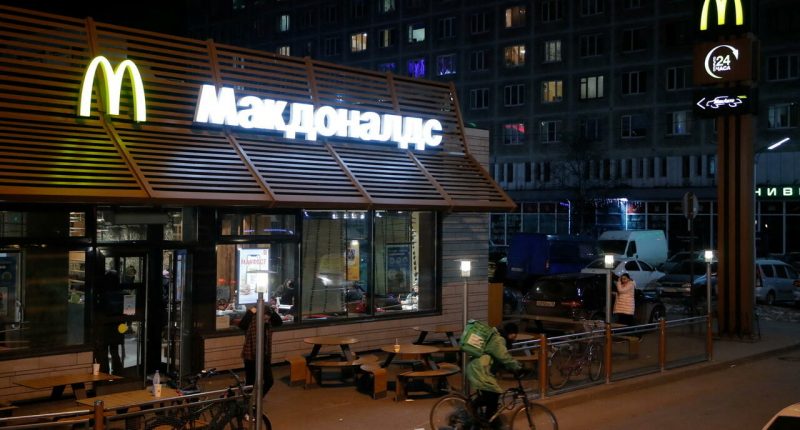The United States and United Kingdom have announced they will be cutting off Russian energy imports in a major tightening of the economic chokehold on Moscow over its invasion of Ukraine.
Multinational corporations Shell and BP have followed suit, saying they would halt new oil and gas purchases.
The moves mark a crucial escalation in international sanctions against Russia as Western allies had initially omitted energy from an array of economic penalties imposed in response to the attack.
President Joe Biden announced the United States embargo on Russian oil, part of a broader prohibition including natural gas and coal, as his Democratic Party had threatened legislation to force his hand, despite the likely impact on already soaring fuel prices.
“Russian oil will no longer be acceptable at US ports and the American people will deal another powerful blow to Putin’s war machine,” Mr Biden said, adding that the decision was taken “in close consultation” with allies.
“Ukraine will never be a victory for Putin,” Mr Biden vowed from the White House, minutes after the UK announced that Europe’s second-largest economy would phase out Russian oil imports by the end of the year.
Oil giants Shell and BP, both based in the UK, said they would stop buying Russian oil and natural gas immediately while Shell also pledged to shut down service stations as well as its aviation fuels and lubricants operations.
“We are working hard to continue to provide the energy that customers and economies need, using non-Russian oil and gas,” a BP spokesman said.
Big brands suspend operations
McDonald’s and Starbucks are temporarily closing hundreds of restaurants in Russia, with Coca-Cola and Pepsi among the latest Western companies to pause operations in the country after it moved troops into Ukraine.
PepsiCo, the soft drink and snack maker, will suspend all advertising in Russia and stop the sale of its drinks brands, while rival Coca-Cola said it will suspend its business there.
Fast-food chain McDonald’s said it would go on paying salaries to its 62,000 employees in Russia.
The closure of McDonald’s 847 restaurants also carry symbolic importance in Russia, where the first location to open, in central Moscow’s Pushkin Square in 1990, became a symbol of flourishing American capitalism as the Soviet Union fell.
Coffee chain Starbucks also said on Tuesday it is suspending all business activity in Russia, including the shipment of its products and cafes run by a licensee.
Bipartisan support for bans
The US ban has support from both parties in Washington, although economists have been divided on the effect of turning off the spigot, with oil prices already soaring above US$120 (A$165) a barrel.
Brent crude, the international benchmark, rose by more than five per cent on news of Biden’s announcement.
US Speaker Nancy Pelosi told members on Sunday that the House of Representatives was exploring a ban, as well as ending trade relations with Russia and Belarus and pushing to curtail Moscow’s access to the World Trade Organization.
Mr Biden — initially reluctant but wary of appearing less tough than Congress on Putin — intervened personally, according to several US media outlets, phoning Ms Pelosi to ask her to drop the initiative.
Ms Pelosi said House Democrats would press ahead anyway with a vote Tuesday on the ban and other measures targeting the Russian ruble, which continued its precipitous fall to finish the US morning only just above half a cent.
‘Dramatic increases’
So far, European Union nations — who are far more reliant on Russian energy than the United States — have declined to take similar action.
Russia accounts for eight per cent of US imports of oil and petroleum products, which means the impact on the world’s largest economy would be easier to bear.
The White House will nevertheless have to reassure voters already alarmed over spiralling fuel prices, which are threatening Democrats’ chances of holding on to Congress in November’s midterm elections.
“Bottom line is that the USA would feel some impact to the loss of supplies from Russia, but we are in a far better position than Europe,” energy analyst Andy Lipow said.
US officials, seeking to offset the loss of Russian oil, reportedly travelled to Venezuela over the weekend to meet with the government of Nicolas Maduro.
The South American country was once a top source of US oil, but Washington halted imports in 2019 following sanctions on the country.
Congressional Democrats have pushed back on the idea, however, voicing reluctance to switch from one unsavoury regime to another.
“We shouldn’t be advancing other countries who don’t share our values,” Montana Senator Jon Tester told reporters.
In a Quinnipiac poll released before the White House announcement, 71 per cent of respondents said they would support a ban on Russian oil even if it meant higher gas prices.
“The next step needs to be to work to get Europe to do the same thing, to wean themselves from Russian oil and gas,” Republican Senator Ted Cruz, who recently introduced a bill to “restore American energy independence,” told CNBC.
“And the way to do that is to have alternative sources, and the obvious alternative sources is the United States.”
Source:sbs.com







